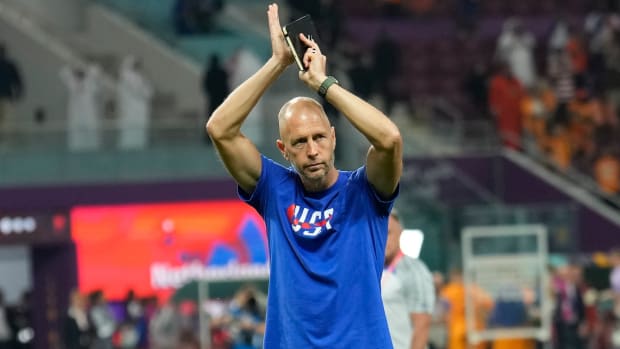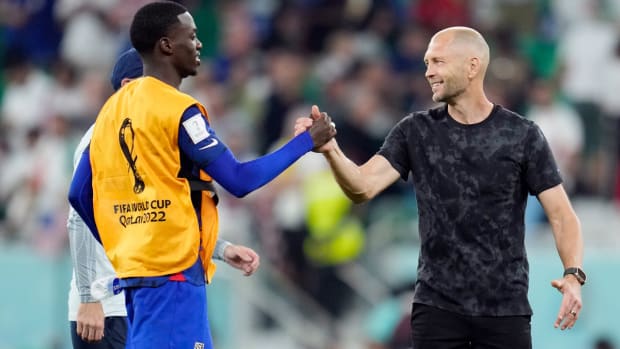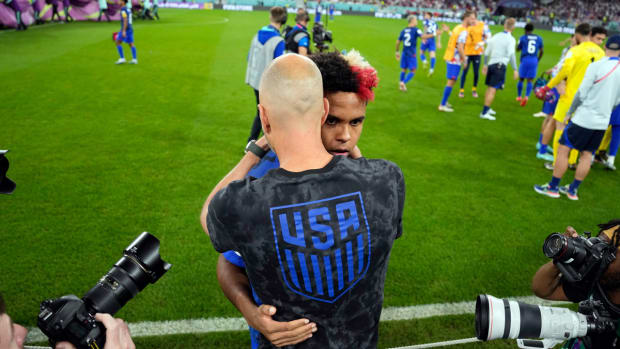AL RAYYAN, Qatar — World Cups can end abruptly. After years of planning and development, months of buildup and anticipation and then the vivid intensity of the tournament itself, the plug is pulled, and it’s over in a blink.
Within a few hours of Saturday night’s round-of-16 loss to the Netherlands, U.S. men’s national team staffers who had been planning for a longer stay here in Qatar were arranging flights home. There was a dinner at the team hotel on The Pearl in northeast Doha—Saturday’s game was the Americans’ first that didn’t kick off at 10 p.m.—and by Sunday morning, several players were already headed to the airport. Some more flew out Monday.
That sudden and demoralizing deceleration can make it difficult to collect your thoughts or draw broad conclusions. Coach Gregg Berhalter certainly wasn’t ready to do that on Saturday at the Khalifa International Stadium, where he spoke for the final time at this World Cup.
“For the last month, month-and-a-half, I’ve just been only focused on the World Cup, only focused on achieving things with this group,” he said when asked about his future with the program. “And the next couple of weeks, I’ll clear my head. I’ll sit down and think about what's next.”

Francisco Seco/AP
What’s next matters. Some World Cups are a culmination, the final exam for a team designed to be reaching its peak. This one, for the U.S., was more of a high-profile way station. The program went young after its failure to qualify in 2018, and Berhalter’s plan and commitment to that strategy was part of the reason he was hired. He used the youngest team in the world during much of World Cup qualifying, brought the second-youngest roster to Qatar and fielded four of the five youngest starting lineups in the tournament through Saturday. The U.S. core will be hitting its prime during the run-up to the North American World Cup in 2026. Tyler Adams, Christian Pulisic, Weston McKennie, Tim Weah, Josh Sargent, Brenden Aaronson, Sergiño Dest, Gio Reyna and Yunus Musah, among others, are all under 25.
The question is whether Berhalter will be along for the rest of the ride with them. His contract expires at the end of the month.
Past outcomes don’t guarantee future results, but previous U.S. coaches haven’t fared well when retained for a second cycle. Bora Milutinović was fired in the spring of 1995, less than a year after guiding the U.S. to the second round of the ’94 World Cup. Bruce Arena failed to recapture the magic of the 2002 quarterfinal run and went winless in Germany four years later. Bob Bradley was extended beyond the second-round finish in ’10, but support for him was tepid, and when Jurgen Klinsmann became available the following year, Bradley was fired. Klinsmann’s second cycle was a disaster and laid the foundation for the failure to qualify for Russia.
Sometimes players need a new voice. Sometimes a coach who may have been the right choice for one part of their journey isn’t the ideal one for that next stage. Berhalter wasn’t without flaws. He never solved the issue up top. Strikers scored only four goals in 14 qualifiers, and the man who tallied three of those, Ricardo Pepi, was left off the World Cup roster. The only goal scored by a No. 9 across four games here in Qatar was Haji Wright’s accidental flick against the Dutch. If there was a moment over the past year when Berhalter could’ve altered the profile and demands of that position and perhaps tweaked the front three to accommodate a different sort of player, he let it pass. As a result, attackers like Reyna and Aaronson had fewer opportunities to contribute at the World Cup, while Pepi, Jordan Pefok and Brandon Vazquez were left at home.
Among the other coaching issues exposed in Qatar were the Americans’ awful performance on attacking set pieces and the difficulty they had dealing with a Dutch press that limited distribution to the outside backs and forced central defenders Tim Ream and Walker Zimmerman to try to build through the middle. The second half against Iran was poor, and Berhalter came very close to regretting adopting such a defensive posture (a 5-4-1 instead of inserting players who might be better in possession) as the U.S. desperately protected its one-goal lead. And overall, scoring three goals in four games just wasn’t going to get it done.

Ashley Landis/AP
But plenty also went right here. The U.S. was outstanding defensively during the group stage and was the only team in the tournament that didn’t yield a goal from open play in its first three matches. Berhalter selected the right goalkeeper, Matt Turner, and made the inspired choice to bring back the 35-year-old Ream—after more than a year away from the national team—in the absence of the injured Miles Robinson and Chris Richards. Ream was excellent. Berhalter’s switch to a 4-4-2 bedeviled England and allowed Adams and Musah to essentially erase Jude Bellingham and Mason Mount from their Group B showdown, while his decision to swap Musah and McKennie against Iran helped set the stage for Pulisic’s iconic game winner. Meanwhile, the Americans’ cohesion, identity, energy and spirit drew frequent praise from opposing coaches. Neither Berhalter nor his players were out of their depth.
U.S. Soccer sporting director Earnie Stewart, who will have the final say on whether Berhalter is offered a new contract, declined to comment here in Qatar. He’ll meet with Berhalter as part of the federation’s customary post-tournament review in the coming weeks. But when asked last month how much the World Cup would impact his opinion of Berhalter’s performance, he suggested that the big picture was more important.
“I'm not gonna say it doesn't matter at all. That’s not it. But I look a little bit further than a couple of games,” Stewart told Sports Illustrated. “And when I say a couple of games—we all understand how big this tournament is. I'll just go back to 2002 as well. At one point during the World Cup, we were out [before South Korea scored a late goal on Poland to send the U.S. through]. I don't think my view on Bruce Arena would have changed one bit—not one bit—if we didn’t go through to the second round.”
And speaking last spring, Stewart said, “We like to blame individuals for not getting results. However, we’re all part of it. When I look at our landscape and how we develop talent, your coaches, no matter if it’s [U.S. women’s coach] Vlatko [Andonovski] or Gregg, are a reflection of what we bring to them. That’s as simple as it works. … A coach is a reflection of the products that we put in front of him.”
It’s Stewart’s job to look around long-term corners, so in addition to results, he said he cares about how a team plays, how athletes are developed and brought through the system, competitive standards in academies and youth soccer competitions, not to mention culture. All of it plays a role and has a subtle influence on gameday.
“If we lose, it’s about how do you do that? That’s really, really important to me, while winning is also extremely important,” Stewart said. “I’m not going to try to brush that away. That’s not it. But there's more to it than only that.”
So how did the U.S. lose? By being a bit too slow in action and thought against a fresher, more clinical and experienced team representing an acknowledged and historic footballing power. The Americans lost with dignity, believing they could’ve gone further, and they lost without pointing fingers, assigning blame or coming apart at the seams that Berhalter and his staff had so carefully sewn.
“I think the hardest thing as a coach is to get everybody going in the same direction,” said defender DeAndre Yedlin, who arrived in Qatar as the U.S.’s only World Cup veteran. “I think [Berhalter has] done that very well. He's got everybody bought into the culture, and that's the most important thing. You hear a lot of talk about vibes with this team, and people like to joke about it, but at the end of the day, I think that could be this team's biggest quality.”
That’s a massive piece of what Berhalter got right. Guiding the youngest national team in the sport through qualifying and into the World Cup, with all the ups and downs and lessons learned along the way, is a noteworthy achievement. He won both the Concacaf Gold Cup and Concacaf Nations League titles with almost completely separate rosters, while overhauling Mexico atop the regional pecking order.

Ashley Landis/AP
Berhalter created an environment that players loved being part of—not every U.S. coach has managed that—as the national team became a revitalizing refuge for many young men trying to navigate their club careers in Europe. Players not only knew what to expect when they came to camp—also important—but looked forward to the experience, and they appreciated the leeway, the freedom to be themselves, the guidance and frequent communication the staff provided. Even when things didn’t go well, like when McKennie was suspended and sent home during the September 2021 qualifying window, Berhalter’s deft handling of the locker room seemed to make the group stronger.
“I think everyone can be proud of how we've handled ourselves, how we've carried ourselves, and the effort we've put in,” defender Antonee Robinson said following the Netherlands loss.
“I hope so,” he added when asked if he thought Berhalter should return. “He’s given a lot of boys their chance to develop with this group, and I feel like in this tournament, we've shown the type of football we can play—and certainly enjoyed playing—every single minute. It'd be nice for him to continue his journey. But that’s completely up to him. We're thankful for everything he's done otherwise.”
Ream said, “I think we were prepared to to win. They prepared us in the best possible way. We played four very, very good games—didn’t do a whole lot wrong. I just think as a group, top to bottom, management down, it was a very unified group, and that's what people need to see.”
Multiple other players, although disappointed in Saturday’s result, expressed similar sentiments. They enjoyed playing for Berhalter and would like have him back. Obviously, nobody was going take a public shot at their manager in the minutes following World Cup elimination. But they could’ve evaded the question or said something like, “That’s not up to me.” They didn’t.
It’s also true that players might not know what’s best for them, and that men playing a World Cup in their late 20s might need something different than what they got in their early 20s. The culture Berhalter built would have to evolve as the team aged, and he’d have to evolve with it. Catching up to the sport’s entrenched powers might also require coaching with more experience in and from those cultures. Berhalter isn’t Dutch manager Louis van Gaal—and van Gaal is among those veteran foreign figures who might be available next year. If Zinedine Zidane succeeds France’s Didier Deschamps as has been rumored, then there will be two recent World Cup–winning coaches, Deschamps and Germany’s Joachim Löw, on the market. Perhaps to beat the best, you’ve got to hire them.
Then there’s one more wrinkle: does Berhalter even want to come back? He was non-committal at the Khalifa. Known as an engaged, detail-obsessed, borderline workaholic, Berhalter, 49, has done most of his coaching over the past four years from an office and over Zoom. The time and energy he’s put into scouting and communicating with players on three continents, scheduling camps and planning for matches that are few and far between might be more enjoyably spent with a club, on the field, coaching every single day. It wouldn’t be a surprise if Berhalter has a bit of envy for Jesse Marsch, who’s grinding away under the bright lights in the Premier League. There’s a decent chance that after this World Cup, Berhalter, who coached Sweden’s Hammarby IF before the Columbus Crew, has a better reputation abroad than he does at home.
“When you look at the way we wanted to play, and did play, it should be positive. The guys should gain confidence about the fact that we can play with anyone in the world the way we want to play,” Berhalter said Saturday when asked to assess the World Cup. “Now, it’s about how do we keep that up and take it to another level, where you can win against teams in a knockout game at the World Cup and you can keep going? So I think the group has done an outstanding job, again, for this to be the youngest group—youngest lineups played in the World Cup—they did a great job. And we definitely put our stamp on this World Cup.”
Now Stewart and Berhalter will have to decide if he gets the chance to put a stamp on another one. It’s not an easy call, especially in a sport, and with a team, where success or failure is often in the eye of the beholder.
“We set out with a goal to show the rest of the world how we can play soccer,” Berhalter said. “And I think we partially achieved that, although we fell short of our goals.”







